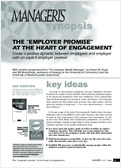Optimizing employee experience

An increasing number of companies are working towards treating their employees as well as they treat their clients. How can you rely on employee experience to develop your company’s performance and attractiveness?
The war for talent will indeed take place. Already, an increasing number of companies are reporting difficulties in finding qualified personnel. As early as 2020, there could be a shortage of 40 million qualified employees to meet global demand for competency. In technology, industry, professional services, luxury and other sectors, employers are multiplying their efforts to attract the best candidates.
And recruitment is only one facet of the issue. Motivating and retaining new generations of staff seems equally complicated. Their conception of work and their expectations have evolved. They encourage companies to rethink the way they are organized and how they manage their staff?with often mixed results. Year after year, the commitment of staff to their company remains extremely low; it reaches just 13% on average according to Gallup.
Faced with these new challenges, the concept of employee experience has renewed the approach to human capital management. Mirroring customer experience, employee experience takes into consideration, from the perspective of the employee, his/her interactions with his/her employer, from the first to the last day of employment and even beyond. It encompasses both the key steps of an employee’s career and his/her everyday moments of happiness and discontent: work space ambience, comfort with work tools, fluidity or not of processes, relationships with colleagues and managers, etc. Employee experience must be approached strategically. It requires in-depth work on the corporate culture to ensure that everyone, from the CEO to the receptionist, shares a common objective: to improve the daily life of his/her colleagues.
Everything else follows. Companies that manage to improve employee experience gain several advantages. Their employees are more invested and perform better. Their customers are more satisfied. They enjoy a better reputation in the market. A virtual circle develops, enabling these companies to attract the best talent.
The task appears monumental, but this is not the case. Rather than resources, it is method and tenacity that are required.
In this synopsis:
- Employee experience: a methodical implementation
- Differentiating through employee experience
- Developing pride, a key to commitment
SubscriberSign in
to download
the synopse (8 p.)
VisitorI want to buy
this synopsis (8 p.)
VisitorI want
to subscribe
See also

Employees 3.0: how to manage them?
The digital revolution has fundamentally changed staff members’ expectations: less formal and more personalized relationships, greater flexibility in career choices… How can you evolve your HR management accordingly?

Aim for excellence in your managerial practices
How can you find the right combination from the various components that constitute the quality of managerial practices? Following Google’s example, you can take inspiration from methods used in operational excellence and experimental science.
